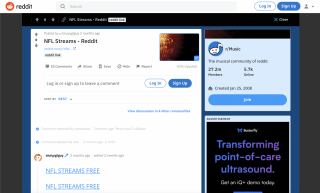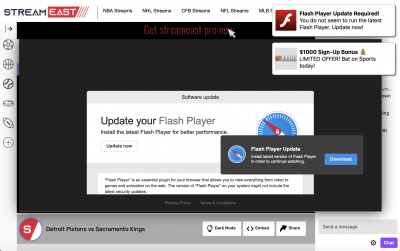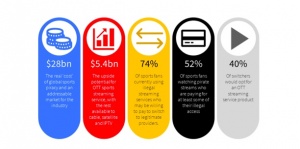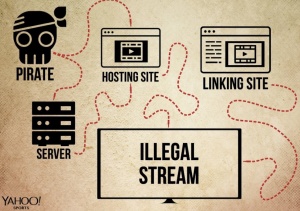Difference between revisions of "Illegal Sports Streams"
| Line 53: | Line 53: | ||
==Information Access== | ==Information Access== | ||
| − | On a larger front, there have been many arguments about information accessibility on the internet. Debates about what information should be free to everyone or to some face debates about the incentive to create content if there is a limited opportunity for just payment. The United Nations Development Program established that information access is a necessary for societal development. But what information should be included in that? Arguments range from all information to no information, but most arguments conclude that public health and safety should be included at the bare minimum. Consequently, this raises questions about access to sports. If the only option to view something is via payment, it excludes those who are unable to afford it from viewing. Players may benefit from the publicity that comes with being a professional athlete, which may increase as accessibility increases. The main benefactors from copyrights are television broadcasters. However, without adequate payment, companies are less likely to have an incentive to record the games, as it requires staff and equipment. Questions then fall onto what information should be accessible and who should pay for the incentive to create and innovate new information. | + | On a larger front, there have been many arguments about information accessibility on the internet. Debates about what information should be free to everyone or to some face debates about the incentive to create content if there is a limited opportunity for just payment. The United Nations Development Program established that information access is a necessary for societal development. <ref name=UN> UNDP, 2003, 'Access to Information', Practice Note, United Nations Development Programme, Oslo Governance Centre, Oslo </ref> But what information should be included in that? Arguments range from all information to no information, but most arguments conclude that public health and safety should be included at the bare minimum. Consequently, this raises questions about access to sports. If the only option to view something is via payment, it excludes those who are unable to afford it from viewing. Some argue that sports are for entertainment purposes and therefore should not be covered under the realm of free information access. Others argue that all information on the internet should be available for widespread public use. Players may benefit from the publicity that comes with being a professional athlete, which may increase as accessibility increases. The main benefactors from copyrights are television broadcasters. However, without adequate payment, companies are less likely to have an incentive to record the games, as it requires staff and equipment. Questions then fall onto what information should be accessible and who should pay for the incentive to create and innovate new information. |
=Impacts= | =Impacts= | ||
Revision as of 22:46, 15 April 2021
editing in progress
The Internet has contributed positively to modern society in a variety of ways. Information is easily accessible with the click of a button and there are constantly new offerings for products, entertainment, etc. One popular use of the internet is to keep up with sports. Previously, viewers had to tune into games on their cable TVs, with a limited scope of which content was available. As the internet grew, many people took to it to find a way to easily keep up with their favorite sports. Along with that came illegal streaming of live sporting events. As the complexity and capabilities of technology grow, it has become increasingly easy for people to stream pirated versions of sporting events and make them freely available to a wider audience. This has cost major sporting organizations billions of dollars in revenue because consumers can watch their beloved sports teams play from random corners of the Internet that allow them to tune in cost-free. There have been many resources developed to combat this problem, but they have found little success.
Contents
Broadcasting Rights
For live sporting events, there may be “no copyright in a sporting spectacle itself,” but “copyright subsists in a broadcast of a sporting event.” [1] This means that the match or game itself is not copyrighted, but the broadcast is. [1] In the case of live sporting events, broadcasting rights fall in the hands of the home team. [2] Teams typically have a contractual agreement with television networks, which grants those networks the right to broadcast their games.
Recently, the rights associated with Internet broadcasting have come under scrutiny due unauthorized streams. [2] Sites that provide free streams of sporting events run into legal trouble with copyright infringement. [3] While the Copyright Act protects the broadcasting rights of sporting events, more legislation has been written since then that is specific to illegal streaming. [3] One example of this legislation is the Commercial Felony Streaming Act. [3] This bill, proposed by Senator Klobuchar in 2011, worked to “change unauthorized streaming from a misdemeanor to a felony.” [4] More specifically, “the legislation would authorize felony penalties for willful, unauthorized streaming of commercially valuable copyrighted material (for purposes of commercial advantage or private financial gain)” [3]
Popular Streaming Sites
There are a wide variety of illegal streaming sites available to consumers. Larger sites often have a wide range of sports, while others sites' have a more niche focus. With all of these different sites at the fingertips of internet users, someone looking to illegally stream their favorite sporting event for free will most likely be able to do so. For example, if someone wants to watch a specific sport, like soccer, there is a site called Steam2Watch whose content consists of various soccer matches. There are also sites like VIPRow that stream many different sports, including football/soccer, UFC, WWE, boxing, tennis, golf, American football, basketball, baseball, ice hockey, rugby, and much more. [5]

Many of the popular illegal streaming sites gain popularity via word of mouth. This can be as simple as exchanging information with friend about where to find a stream. Additionally, on the popular social media site Reddit, there are communities called subreddits where people list links that others can use to stream different sporting events. Examples of subreddits people might go to if they want to stream a sporting event are NHL streams, NBA streams, and NFL streams. Some of the streaming sites that frequently pop up on these subreddits are Buffstreams, StreamEast, Grandma Streams, and Crack Streams. From a legal standpoint, Reddit can allow these links to illegal streaming sites to be posted because the platform gives users the freedom to post whatever they want. The legal responsibility then falls on individual users for posting illegal content. However, in recent years however, Reddit has chosen to remove some subreddits, like NBA streams, due to increases in Digital Millennium Copyright Act notices. [7]
Popularity
The increased ease technologically of creating illegal sports streams has been met with an increase in the percentage of people who take advantage of these streams. A 2020 study conducted by Ampere Analysis found that 51% of all sports fans regularly watch their preferred sports content on pirated sources. Only 16% of the study's participants claimed that they have never watched sports using an illegal streaming service. This study yielded results with high confidence seeing as the sample size included over 6,000 sports fans from over ten different countries. [8] This study indicates that the issue of illegal sports streaming extends far beyond just one country. Thus there are further challenges with imposing legislation internationally. The problem has grown into a global nightmare for many of the world's top sports leagues, including the NFL, NBA, and English Premier League.
Available data allows for further analysis of the users who utilize illegal sports streams, specifically in terms of age distribution. According to a research study conducted by Infront Lab, “the lower the viewer's age, the more likely he or she is to opt for a pirated broadcast.” [9] This statement is supported by the fact that 54% of millennials watch sports through illegal streaming services. Furthermore, 77% of people over the age of 56 watch sports legally on television, and this figure drops to 57% for people between the ages of 40 and 56. This figure again drops to 35% for people below the age of 40.
The same study also provides insights into which sports are illegally streamed the most. According to the study, soccer is the most pirated sport in the world. This is likely because soccer is also the most popular sport in the world. Moreover, it may be difficult for international viewers to find legal streams, making illegal streaming the easiest option for these users. Of all the illegal sports streaming online, about 27.4% is soccer, 25.5% is basketball, 13% is mixed sporting events, 10.5% is tennis, and 8.5% is motor sports. [9]
Why Do Illegal Streaming Websites Exist

Like many other things, money is the primary motivator for a lot of people. Even though most illegal streams are free to consumers, they can generate a ton of money for their creators. There are two main sources of revenue these streams can generate. The first is from advertisements that appear on the streaming sites themselves. Anyone who has visited an illegal streaming site before is all too familiar with the cluster of advertisements and pop-up ads that typically show up when loading the website. The second is from advertisements within the video that is streaming. During an illegal stream, advertisements might pop up every now and then or at a natural stopping point in the event being viewed. Nevertheless, all of the revenue in the realm of illegal streams centers around advertisements. [11] For many users, they are happy to watch ads instead of paying for a service. Additionally, it is common for individuals to need to pay for access to a variety of different platforms in order to access all of the content they want, both sports related and unrelated. Those costs can add up overtime, and it can make natural sense to use a streaming platform to save money, especially if watching is a rare occurrence. According to the The Independent, “digital pirates can make hundreds of millions of pounds of profits per year by monetizing stolen content.” [12] It has now become easy for tech experts to make a lot of money by creating these illegal streams, making it likely that they are here to stay for awhile.
Sometimes it can be the only way for sports fans to access a specific game they want to watch. When it comes to the MLB, certain games have "blackout" restrictions that offer legal, cable screening to a limited geographical region. This causes users who pay for authenticated access to not be able to see all of the games that they choose. These restrictions are even more intensely strict internationally and in US territories. For example, all San Francisco Giants and Oakland A's games are blacked out in Guam. [13] The policies are stated to be intended for protection of thehome team broadcast station copyrights, but also have various other implications and restrictions. Illegal streams, VPN blockers, and other solutions provide access to users, regardless of their willingness to pay for the program, in order to work around these policies.
Difficulties & Controversies
Many companies and major sports leagues, such as ESPN and the NBA, fight an uphill battle in their efforts to combat illegal sports streams because there are so many variables at play. First of all, there are thousands of illegal sports streaming sites in existence, making it very difficult to shut them all down. Even if one site gets shut down, viewers can simply jump to the next one until the original stream they were watching is back up and running under a different identity. Another reason illegal streaming is so difficult to stop is the professionalization of the illegal streaming industry. Streamers and pirates have become so technologically advanced and specialized in what they do that they are a difficult opponent for companies to take down. Finally, there are the legislative battles that major sports leagues are facing in their attempts to shut down pirated streams. In 2012, a bill was proposed called the Stop Online Piracy Act (SOPA) that would have enacted polices to limit the abilities of illegal streams. SOPA brought up major concerns about restricting Internet freedom, which ultimately led the bill to fizzle out, and no real solutions to the problem of illegal streaming were created. [14]
The UFC's Attempts to Combat Illegal Streaming
A large chunk of the UFC’s revenue comes from pay-per-view sales, which is essentially where people pay to watch individual fights on their television at home. The idea that people can now illegally stream fights and watch them for free poses a huge problem for the UFC in terms of revenue. Dana White, the president of the UFC, has threatened illegal pirates throughout the last several months. He claimed that the UFC was listening to the phones and watching the houses of illegal pirates and that if any of them went live, they would be arrested. He also said that after doing this for the first two PPV events of 2021, their “target” elected to not go live with the pirated link. [15]
Dana White’s plan is to target illegal pirates each time the UFC has an event until they can scare everyone away from streaming the events illegally. The Protecting Lawful Streaming Act (PLSA) makes White's fight easier because it allows him to more easily prosecute illegal streamers. White has already used the PLSA to shut down Rocco Walker, one of the largest streamers of pirated UFC events. White’s threats towards illegal pirates caused Walker to remove his streaming website. [16]
Information Access
On a larger front, there have been many arguments about information accessibility on the internet. Debates about what information should be free to everyone or to some face debates about the incentive to create content if there is a limited opportunity for just payment. The United Nations Development Program established that information access is a necessary for societal development. [17] But what information should be included in that? Arguments range from all information to no information, but most arguments conclude that public health and safety should be included at the bare minimum. Consequently, this raises questions about access to sports. If the only option to view something is via payment, it excludes those who are unable to afford it from viewing. Some argue that sports are for entertainment purposes and therefore should not be covered under the realm of free information access. Others argue that all information on the internet should be available for widespread public use. Players may benefit from the publicity that comes with being a professional athlete, which may increase as accessibility increases. The main benefactors from copyrights are television broadcasters. However, without adequate payment, companies are less likely to have an incentive to record the games, as it requires staff and equipment. Questions then fall onto what information should be accessible and who should pay for the incentive to create and innovate new information.
Impacts
By design, is difficult to pinpoint the exact impact that illegal activities have on an industry. Nonetheless, media focus and the expression of concern from industry players concludes illegal streams have a significant impact on the sports broadcasting industry. For example, for one of the most exciting boxing matches of the year, Tyson Fury vs. Deontay Wilder, 325,000 people in the United States paid to watch the fight legally. However, an estimated 1.9 million people watched the fight through pirated streams, and seeing as the fight cost $75 to purchase, this loss of customers to free streams caused the channels that sold the PPV to lose millions of dollars. [18] Out of every sport that can be streamed illegally, the UFC is estimated to take the biggest hit in revenue because all of their events are pay-per-view, meaning that customers have to purchase the rights to watch each fight rather than all the events being available to viewers with the purchase of a cable package.
Despite the demand for NBA games having increased, Adam Silver, the president of the NBA, has noticed a decrease in the league's revenue from television. In an interview discussing this topic, Silver commented, “we know from every bit of research we have, from all the social media platforms, there’s more interest in our product than the ratings reflect.” [18] In order to address this problem, it is important to understand the root of the issue. If one wants to increase the number of people that pay for legal streaming services, they have to understand the customers' point of view. Customers can either pay for a high quality service or sacrifice some video quality and lag time to stream events for free. Sports leagues around the world are starting to understand this and identify ways to make legal streaming cheaper and more readily available to viewers. To attract more customers, these leagues need to advertise that their legal streaming services will provide users with better experiences, higher quality entertainment, and less complications from annoying advertisements, buffering, and lag time. For example, the National Football League (NFL) has introduced new streaming services that are free to users via Twitter and Twitch so as to increase legal viewership of their games. [19] Although tactics like this have seen some success, there is a lot more work to be done in the realm of illegal sports streams.
References
O'Halloran, Joseph. “Anti-Piracy Tech Can Drive $28BN Goldmine for Sports.” Rapid TV News Main News, 15 Mar. 2021, www.rapidtvnews.com/2021031560098/anti-piracy-tech-can-drive-28bn-goldmine-for-sports.html#axzz6q3nCTIXY.- ↑ 1.0 1.1 Kariyawasam, Kanchana, and Tsai Matthew. “Copyright and Live Streaming of Sports Betting.” International Review of Law, Computers & Technology, 27 Mar. 2017, https://core.ac.uk/download/pdf/143899786.pdf.
- ↑ 2.0 2.1 Horner, Stephanie N. “DMCA: Professional Sports Leagues' Answer to Protecting Their Broadcasting Rights Against Illegal Streaming.” Marquette Sports Law Review, 2014, https://scholarship.law.marquette.edu/cgi/viewcontent.cgi?article=1623&=&context=sportslaw&=&sei-redir=1&referer=https%253A%252F%252Fscholar.google.com%252Fscholar%253Fhl%253Den%2526as_sdt%253D0%25252C23%2526q%253Dillegal%252Bsports%252Bstreams%2526btnG%253D#search=%22illegal%20sports%20streams%22.
- ↑ 3.0 3.1 3.2 3.3 Yeh, Brian T. “Illegal Internet Streaming of Copyrighted Content: Legislation in the 112th Congress.” Congressional Research Service, 29 Aug. 2011, https://www.everycrsreport.com/files/20110829_R41975_f82732a381ec3d472792d5b4ac3d36cad2ebbddb.pdf.
- ↑ Yostanto, Jeff. “The Commercial Felony Streaming Act: The Call For Expansion of Criminal Copyright Infringement.” Marquette Intellectual Property Law Review, 2016, https://scholarship.law.marquette.edu/cgi/viewcontent.cgi?article=1298&=&context=iplr&=&sei-redir=1&referer=https%253A%252F%252Fscholar.google.com%252Fscholar%253Fhl%253Den%2526as_sdt%253D0%25252C23%2526q%253DCommercial%252BFelony%252BStreaming%252BAct%2526btnG%253D#search=%22Commercial%20Felony%20Streaming%20Act%22.
- ↑ Ray, Goddy. “10 Best Free Sports Streaming Sites That Actually Work.” Surfshark, 11 Dec. 2020, surfshark.com/blog/10-best-free-sports-streaming-sites.
- ↑ "NFL Streams - Reddit." Reddit, https://www.reddit.com/r/Music/comments/kgxvn7/nfl_streams_reddit/.
- ↑ “Here’s Why Reddit Banned NBAStreams, the Subreddit That Showed Free Live NBA Games.” Sporting News, 2 Nov. 2019, www.sportingnews.com/us/nba/news/reddit-nbastreams-subreddit-free-live-nba-games/qkz5z8oaw2az1wae03hlf39ts.
- ↑ Carp, Sam. “Study: 51% of Sports Fans Watch Pirate Streams despite 89% Owning Subscriptions.” SportsPro, 4 June 2020, www.sportspromedia.com/news/live-sport-piracy-service-pay-tv-ott-platform-subscription-study.
- ↑ 9.0 9.1 Daskal, Ouriel. “How to Solve the Problem of Piracy in Sports Broadcasts?” CTECH - Www.calcalistech.com, 18 Feb. 2021, www.calcalistech.com/ctech/articles/0,7340,L-3894473,00.html.
- ↑ "Detroit Pistons vs Sacramento Kings." Stream East, https://www.streameast.live/basketball/detroit-pistons-sacramento-kings/.
- ↑ Joyner, Hunter. “Streaming Sites: Are They Illegal? How Do They Make Money?” Zippia, 9 Jan. 2018, www.zippia.com/advice/streaming-sites-are-they-illegal-how-do-they-make-money/.
- ↑ Sulleyman, Aatif. “Something Horrific Is Happening When You Illegally Stream TV Shows. And It's Making These People a Lot of Money.” The Independent, Independent Digital News and Media, 19 Sept. 2017, www.independent.co.uk/life-style/gadgets-and-tech/news/piracy-streaming-illegal-feeds-how-criminals-make-money-a7954026.html.
- ↑ Mlb.tv: Blackout policy. (n.d.). Retrieved April 16, 2021, from https://www.mlb.com/live-stream-games/help-center/blackout-policy
- ↑ “SOPA/PIPA: Internet Blacklist Legislation.” Electronic Frontier Foundation, www.eff.org/issues/coica-internet-censorship-and-copyright-bill.
- ↑ Fowlkes, Ben. “How Dana White and the UFC Plan to Crack down on Illegal Streamers.” The Athletic, 4 Mar. 2021, theathletic.com/2425630/2021/03/04/how-dana-white-and-the-ufc-plan-to-crack-down-on-illegal-streamers/#.
- ↑ Hewitt, Madison. “Closing the Streaming Loophole: How the Protecting Lawful Streaming Act Allows Dana White to Punish Illegal UFC Streamers | Villanova University.” Villanova University, 21 Mar. 2021, www1.villanova.edu/villanova/law/academics/sportslaw/commentary/mslj_blog/2021/ClosingtheStreamingLoophole.html.
- ↑ UNDP, 2003, 'Access to Information', Practice Note, United Nations Development Programme, Oslo Governance Centre, Oslo
- ↑ 18.0 18.1 Bushnell, Henry. “Inside the Complex World of Illegal Sports Streaming.” Yahoo!, Yahoo!, 27 Mar. 2019, www.yahoo.com/lifestyle/inside-the-complex-world-of-illegal-sports-streaming-040816430.html.
- ↑ Soper, Taylor. “Twitter Says Live Streaming of NFL Games Went 'Incredibly Well'; No Word on Deal for next Season.” GeekWire, 3 Jan. 2017, www.geekwire.com/2017/twitter-says-live-streaming-nfl-games-went-incredibly-well-no-word-deal-next-season/.



